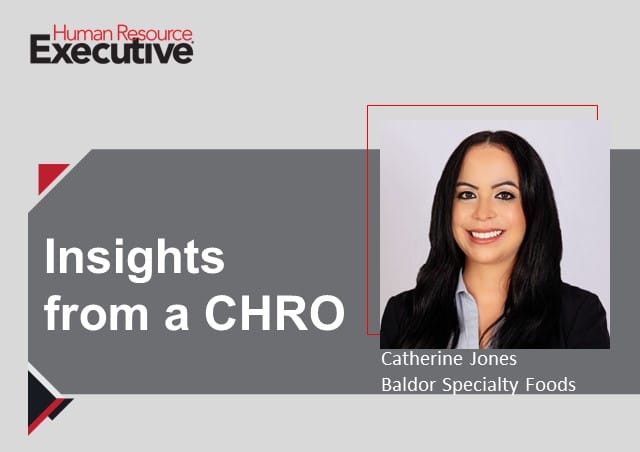When Catherine Jones joined Baldor Specialty Foods as senior vice president of HR in the spring of 2022, culture was immediately top of mind—both the organization’s and her own.
“When I first came on board,” Jones says, “I spent quite a bit of time observing how people interacted with other, how they responded to situations and, at the same time, how they reacted to me joining Baldor—especially a Brit who had never been to the Bronx before.”
Though new to that part of New York and the company—which works with more than 1,000 farms and delivers food to restaurants, hospitals, schools and more throughout the Northeastern U.S.—Jones tapped into her extensive HR experience to assess what Baldor’s culture looked like.
Jones—who has held HR leadership positions at companies including Stuart Dean, Computacenter and Telefónica—says she immediately noticed the pride employees took in their work, their passion for food and an “authentic, genuine care” for each other. She held “values workshops,” inviting everyone from drivers to senior leaders to contribute their views on Baldor values.
“For me, culture equals values plus behavior, so I got people to talk openly about who they are when they operate at their natural best—when no one is looking,” she says. “Running the workshops was invaluable, as I really got to see firsthand the passion that people feel for the company.”
Ultimately, that passion, Jones says, is fueled by a culture that prioritizes “doing the right thing”—by workers, customers and vendors.
“Put plain and simple, people care,” says Jones, who recently spoke with HRE about how she’s deepening and leveraging that culture to drive HR and business success.
Jones: That’s a hard one to answer, as it feels like we are just beginning to see the fruits of our labor and there’s so much more that we need to do from an HR perspective. I’m recalling the feedback that I was given the other day by our night warehouse operations director, who stopped me early one morning and was kind enough to tell me what a great job I was doing. Accepting compliments is not within my nature so my immediate response was, “What do you mean”?
In summary, he said he felt that for the first time in his 20 years with Baldor, HR was acting as a true partner to the business, was driving change and was investing in our people. So, in answer to your question, I’m putting a team in place that is moving away from being transactional and administrative to one that is aligned to the business and has a seat and voice at the table.
HRE: How are you working to differentiate Baldor’s approach to leadership development?
Jones: When I worked for Telefónica, I was very privileged to be immersed in the world of leadership development and discovered my love for learning, development and coaching. It was during my time there that I became clear on my own personal purpose—both as an HR leader and mother of three boys—which centers around helping prepare people to shine, to find and take their place in the world.
One of our priorities for 2023 and 2024 at Baldor is developing our people. When we were a smaller company, it was easier to pass job training down by manager to employee, one on one. But as we’ve scaled to become an organization of 2,500 across a region spanning from Maine to Virginia, we’re building out a program of leadership development interventions not just for those people currently responsible for leading and managing others, but also for those people who aspire to be the future talent and leaders of the company.
See also: Driving leadership development forward with a focus on relational skills
I’m very proud of the fact that we have started this with a “train the trainer” program, in which some of our superstar employees who role-model our values help train their peers and subordinates. We identified a group of 17 people—a real mix of managers across operations, transportation, sales and production—and we have trained them to deliver what we’ve called a Front Line Leader program aimed at our 120 or so team leaders and supervisors.
Some of the 17 had never delivered a presentation before—let alone, training—so, as you can imagine, I had a number of people questioning whether I was doing the right thing! It has been wonderful to see how they have all embraced the challenge and how well they have done. It was a win-win on all levels, as not only did the people delivering the training feel empowered and learn presentation skills that are necessary for leadership, but also our team leaders and supervisors got to see their managers in a very different light.
HRE: Where should HR be focusing their energies when it comes to helping their organizations and workforces navigate the impacts of ongoing external uncertainty?
Jones: People need to feel connected. Engaged employees are more likely to be resilient in the face of uncertainty and, as a result, able to contribute positively to the organization’s success. That means investing in our managers who are leading teams so that they feel equipped to help navigate and lead through times of change and uncertainty. I’ve seen firsthand that leaders who have strong emotional intelligence are far more effective in handling employee relations, conflict resolution and the wellbeing of their people.
I’m a great believer that, to be able to lead people, you’ve got to know yourself well and, of course, your people. It’s important that people know and feel that they matter and that this isn’t just a job. We spend so much time at work that it’s important to create an environment where people want to be, that they feel part of something, that they are recognized for their efforts and can benefit from the success of the company. HR leaders need to be agile and able to respond to the ever-changing landscape.
Related: 4 ways to preserve culture during rapid growth
HRE: What are the skills imperative to HR leadership success today that weren’t as integral to the role when you entered the field?
Jones: I think I might be giving away my age if I answer this question! In all seriousness, there are probably four key areas that I would call out that have become much more apparent and needed today:
- Technology: the need to understand and leverage technology to streamline HR processes, improve the employee experience and make data-driven decisions
- Change management: The business environment is constantly changing, and HR leaders need to be skilled in managing organizational change. As our President Michael Muyzk often reminds us: “What got us here is not what will get us to the next chapter of Baldor’s journey and story.”
- Legal compliance: Employment laws and regulations are constantly evolving, and staying up to date with legal regulations is key.
- Strategic thinking: The value of HR has been seen for some time now, and it’s great to be recognized as a strategic partner. The role of HR leadership has expanded beyond the traditional administrative tasks, which is how it was when I first started out in my career. Today’s HR leaders need to have a broader skill set that encompasses technology, analytics, diversity, change management and managing through an ever-evolving workplace landscape.
It’s an exciting time to be in HR. Thankfully, long gone are the days when going into HR was seen as not particularly rewarding and boring.
HRE: How have your global work experiences influenced your approach to HR?
Jones: I’m incredibly lucky to have spent time working in a number of different countries, and it’s an experience that I always encourage people to do if they can. To work in a culture that is different to your own helps you see things a different way. And when you are operating in a country where English is not the first language, you really have to hone your listening skills to understand what’s going on under the surface. That is especially relevant in this role, where for 75% of our staff, English is not their first language.
I’m conscious of how to build an inclusive environment where language fluency doesn’t become a barrier to employee experience. Developing the art of being truly present and listening with intent is one of the key skills to being a good HR leader. My global experience has also taught me resilience and adaptability and one of my favorite sayings, which people have often heard me say: “There’s always a solution.”
But the biggest takeaway for me in terms of my global work experience is how important diversity is because, with diversity, you get the richness of ideas and different perspectives, and that is forefront in my mind as we continue to build the HR team here at Baldor.
Credit: Source link











